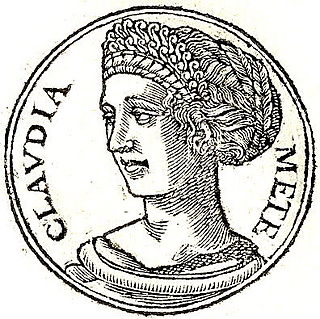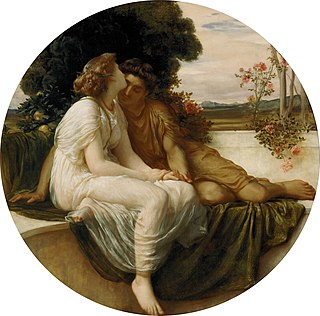This article is written like a personal reflection, personal essay, or argumentative essay that states a Wikipedia editor's personal feelings or presents an original argument about a topic.(November 2021) |
Catullus 11 is a poem by Catullus.
This article is written like a personal reflection, personal essay, or argumentative essay that states a Wikipedia editor's personal feelings or presents an original argument about a topic.(November 2021) |
Catullus 11 is a poem by Catullus.
Poem 11 is one of the two poems that Catullus writes in the Sapphic meter. The other, poem 51, is Catullus' version of one of Sappho's poems. In poem 11, Catullus asks his two friends, Furius and Aurelius, to deliver a message to an unknown girl who is understood to be Lesbia. This message tells Lesbia that Catullus no longer wants to be with her.
Furius is also mentioned in poems 16, 23, and 26. Aurelius is also mentioned in poems 15, 16, 21. [1]
In Catullus 11, there is a different tone in the way Catullus addresses his friends Furius and Aurelius than how they are usually mentioned in other poems. In other poems, they are usually addressed by Catullus in a condescending manner, but in this poem, he addresses them in a very serious manner. Also, in the first three stanzas, Catullus implies that he will go with Furius and Aurelius to several different places around the world, trying to express how good of friends they are, but, ironically, he asks them to just walk across the street and break up with his girlfriend without him. Another unusual thing Catullus does in this poem is that he compliments Caesar in line 10. This in very uncharacteristic of Catullus as compared to his other poems, as he is usually not very complimentary of Caesar. Throughout the first half of the poem, Catullus builds a very romantic atmosphere through his writing. But, in the second half, the mood of the poem turns drastically, as he starts insulting Lesbia.
Scholars are divided on the interpretation of how Catullus addresses Furius and Aurelius in this poem. Some think that he is being serious and truly holds Furius and Aurelius as some of his closest friends that he will have until he dies. Others believe that Catullus has more of an ironic tone. For example, Catullus' tone switches dramatically in the second half of the poem, as he asks them to just walk across the street to Lesbia after naming all these far away places to go to. This hints that Catullus' tone might be more on the ironical side. But, in general, it can be argued either way, as it seems he is serious in the first half, but this seriousness is deflated in the last 2 stanzas of the poem. [2]

Gaius Valerius Catullus, called Catullus, was a Latin neoteric poet of the late Roman Republic. His surviving works remain widely read due to their popularity as teaching tools and more personal or sexually explicit themes.
Latin literature includes the essays, histories, poems, plays, and other writings written in the Latin language. The beginning of formal Latin literature dates to 240 BC, when the first stage play in Latin was performed in Rome. Latin literature flourished for the next six centuries. The classical era of Latin literature can be roughly divided into several periods: Early Latin literature, The Golden Age, The Imperial Period and Late Antiquity.

Catulli Carmina is a cantata by Carl Orff dating from 1940–1943. He described it as ludi scaenici. The work mostly sets poems of the Latin poet Catullus to music, with some text by the composer. Catulli Carmina is part of Trionfi, the musical trilogy that also includes the Carmina Burana and Trionfo di Afrodite. It is scored for a full mixed choir, soprano and tenor soloists, and an entirely percussive orchestra – possibly inspired by Stravinsky's Les noces – consisting of four pianos, timpani, bass drum, 3 tambourines, triangle, castanets, maracas, suspended and crash cymbals, antique cymbal, tam-tam, lithophone, metallophone, 2 glockenspiels, wood block, xylophone, and tenor xylophone/low xylophone.

Clodia, nicknamed Quadrantaria, Nola, Medea Palatina by Cicero, and occasionally referred to in scholarship as Clodia Metelli, was one of three known daughters of the ancient Roman patrician Appius Claudius Pulcher.

The Sapphic stanza, named after Sappho, is an Aeolic verse form of four lines. Originally composed in quantitative verse and unrhymed, since the Middle Ages imitations of the form typically feature rhyme and accentual prosody. It is "the longest lived of the Classical lyric strophes in the West".
Marcus Furius Bibaculus, was a Roman poet, who flourished during the last century of the Republic.

Pro Caelio is a speech given on 4 April 56 BC, by the famed Roman orator Marcus Tullius Cicero in defence of Marcus Caelius Rufus, who had once been Cicero's pupil but more recently had become estranged from him. Cicero's reasons for defending Caelius are uncertain, but one motive may have been his hatred of Publius Clodius Pulcher, who two years earlier had passed a law which had forced Cicero into exile, and whose sister Cicero attacks mercilessly in this speech.
Marcus Caelius Rufus was an orator and politician in the late Roman Republic. He was born into a wealthy equestrian family from Interamnia Praetuttiorum, on the central east coast of Italy. He is best known for his prosecution of Gaius Antonius Hybrida in 59 BC. He was also known for his trial for public violence in March 56 BC, when Cicero defended him in the extant speech Pro Caelio, and as both recipient and author of some of the best-written letters in the ad Familiares corpus of Cicero's extant correspondence. He may be the Rufus named in the poems of Catullus.
Catullus 49 is a poem by the Roman poet Gaius Valerius Catullus (c. 84–c. 54 BC) sent to Marcus Tullius Cicero as a superficially laudatory poem. Like the majority of Catullus' poems, the meter of this poem is hendecasyllabic. This is also the only time Cicero is ever mentioned in any of Catullus' poems.

Catullus 3 is a poem by Roman poet Gaius Valerius Catullus that laments the death of a pet sparrow (passer) for which an unnamed girl (puella), possibly Catullus' lover Lesbia, had an affection. Written in hendecasyllabic meter, it is considered to be one of the most famous of Latin poems.

Catullus 2 is a poem by Roman poet Gaius Valerius Catullus (c. 84 – c. 54 BCE) that describes the affectionate relationship between an unnamed puella ('girl', possibly Catullus' lover, Lesbia), and her pet sparrow. As scholar and poet John Swinnerton Phillimore has noted, "The charm of this poem, blurred as it is by a corrupt manuscript tradition, has made it one of the most famous in Catullus' book." The meter of this poem is hendecasyllabic, a common form in Catullus' poetry.
Catullus 101 is an elegiac poem written by the Roman poet Gaius Valerius Catullus. It is addressed to Catullus' dead brother or, strictly speaking, to the "mute ashes" which are the only remaining evidence of his brother's body.

Catullus 8 is a Latin poem of nineteen lines in choliambic metre by the Roman poet Catullus, known by its incipit, Miser Catulle.

Catullus 5 is a passionate ode to Lesbia and one of the most famous poems by Catullus. The poem encourages lovers to scorn the snide comments of others, and to live only for each other, since life is brief and death brings a night of perpetual sleep. This poem has been translated and imitated many times.

The poetry of Gaius Valerius Catullus was written towards the end of the Roman Republic. It describes the lifestyle of the poet and his friends, as well as, most famously, his love for the woman he calls Lesbia.
Catullus 16 or Carmen 16 is a poem by Gaius Valerius Catullus. The poem, written in a hendecasyllabic (11-syllable) meter, was considered to be so sexually explicit following its rediscovery in the following centuries that a full English translation was not published until the 20th century. The first line, Pēdīcābo ego vōs et irrumābō, sometimes used as a title, has been called "one of the filthiest expressions ever written in Latin—or in any other language".
Poem 68 is a complex elegy written by Catullus, who lived in the 1st century BCE during the time of the Roman Republic. This poem addresses common themes of Catullus' poetry such as friendship, poetic activity, love and betrayal, and grief for his brother. The poem is addressed to his friend, Manius or Allius, and engages with scenes from the myth of Troy.
Sappho 31 is an archaic Greek lyric poem by the ancient Greek poet Sappho of the island of Lesbos. The poem is also known as phainetai moi after the opening words of its first line. It is one of Sappho's most famous poems, describing her love for a young woman.

Iambus or iambic poetry was a genre of ancient Greek poetry that included but was not restricted to the iambic meter and whose origins modern scholars have traced to the cults of Demeter and Dionysus. The genre featured insulting and obscene language and sometimes it is referred to as "blame poetry". For Alexandrian editors, however, iambus signified any poetry of an informal kind that was intended to entertain, and it seems to have been performed on similar occasions as elegy even though lacking elegy's decorum. The Archaic Greek poets Archilochus, Semonides and Hipponax were among the most famous of its early exponents. The Alexandrian poet Callimachus composed "iambic" poems against contemporary scholars, which were collected in an edition of about a thousand lines, of which fragments of thirteen poems survive. He in turn influenced Roman poets such as Catullus, who composed satirical epigrams that popularized Hipponax's choliamb. Horace's Epodes on the other hand were mainly imitations of Archilochus and, as with the Greek poet, his invectives took the forms both of private revenge and denunciation of social offenders.